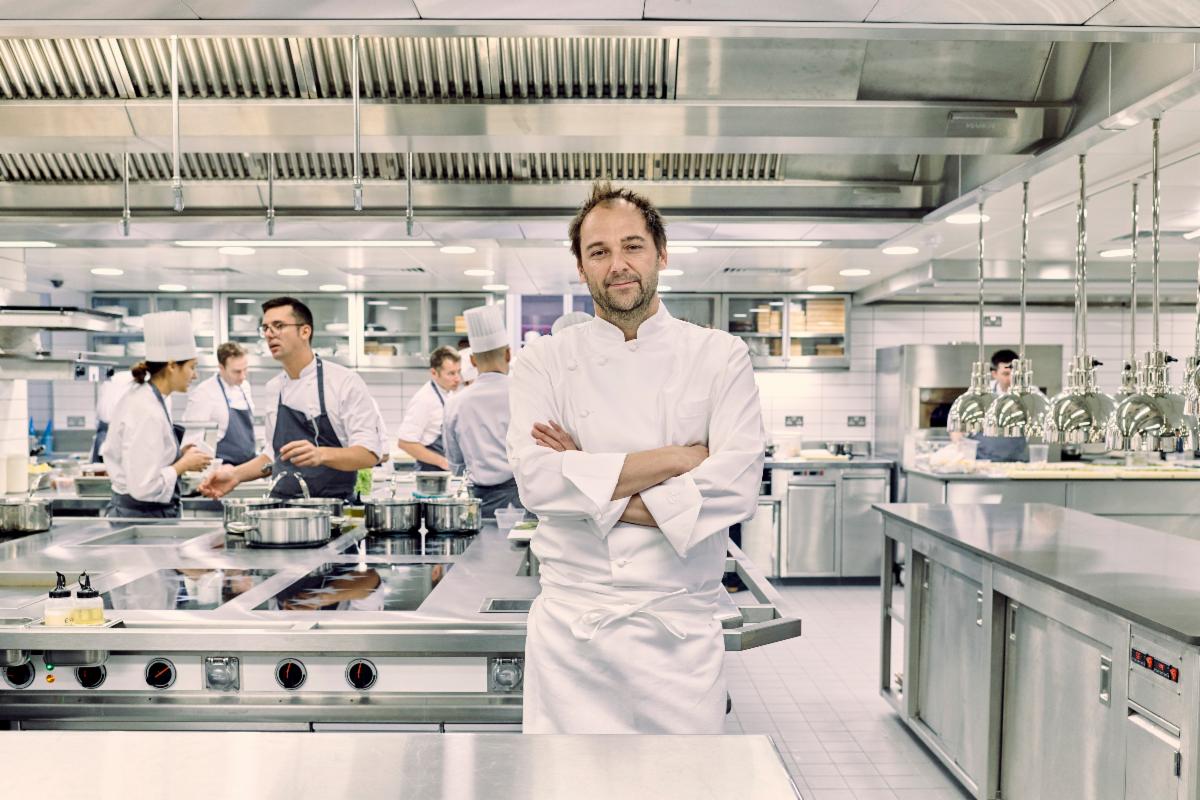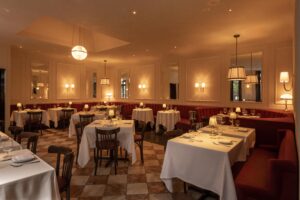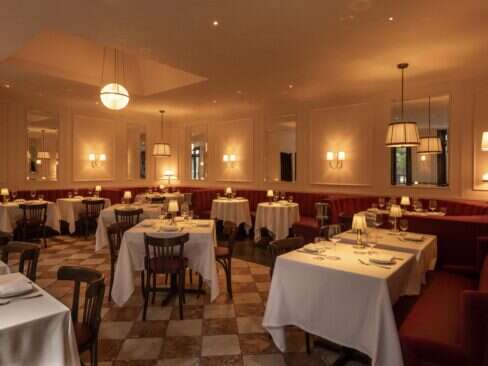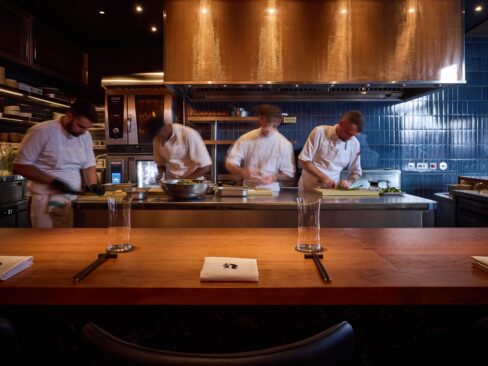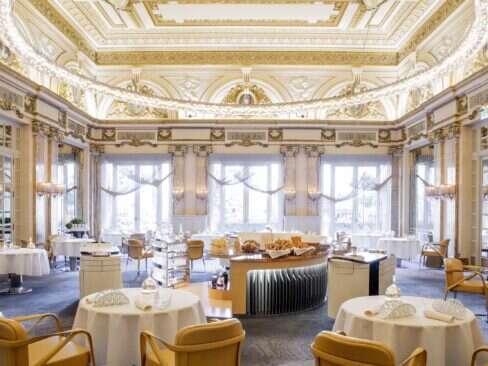In times when top chefs have become household names, some have been making waves beyond merely seeking fame and fortune, and have become standard-bearers for sustainable dining. Diners, as well as seeking culinary brilliance, are increasingly aware of the need for restaurants to be sustainable, and of their impact on the environment. The early stirring of this movement was seen in the food of Alice Waters at Chez Panisse in California. From when it opened in 1971 this restaurant served food purchased from local farmers rather than large catering suppliers, and influenced many chefs to take a “farm to table” approach to sourcing their produce on a much more local basis.
This was not an idea that was invented in California, as chefs in many other countries could testify, but Chez Panisse became the poster child for the movement. Chefs began to emphasize the sources of their produce more than they used to, naming their suppliers on menus and championing the quality of previously obscure local ingredients. Even that most traditional of food observers, the venerable Michelin Guide, launched “green stars” in its 2020 guides to highlight sustainable gastronomy, alongside its traditional red stars to single out exceptional cooking.
Through the examples of these pioneering chefs, we can see how fine dining can continue to flourish while carving out a more sustainable path. With a global population nearing eight billion, it is incumbent on the restaurant industry to find ways to serve exciting, innovative and enjoyable food in a way that is viable for generations to come. The sustainable chefs featured in this article show that such an approach does not require any compromise on flavor and that the very finest restaurant food can be produced in harmony with nature.
[See also: The Most Iconic Restaurants of the Elite Traveler Era]
The Trail Blazers
Dan Barber
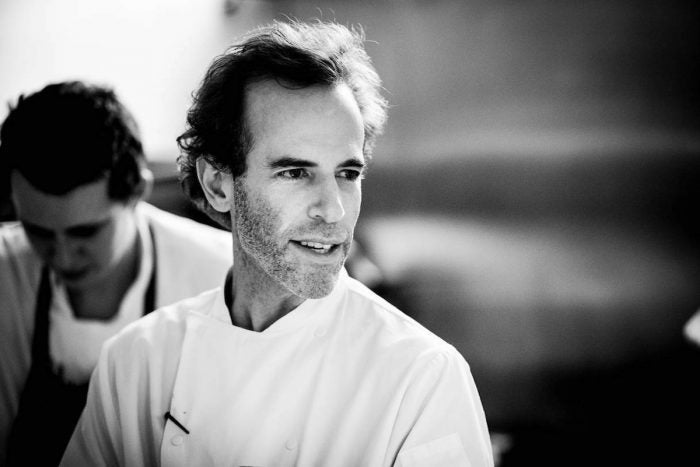
Dan Barber is a world-leading sustainable chef / ©Richard Boll
American chef Dan Barber has become the modern standard-bearer for sustainable restaurants. At his restaurant Blue Hill at Stone Barns, a two-hour drive north from Manhattan in rural New York State, the emphasis is on vegetables grown on the premises and on nearby farms in the Hudson Valley. Dish after dish of local vegetables is presented, with meat dishes that use animals that were raised on local farms. Even the butter is made from the milk of cows brought up on the premises, with my waitress actually telling me the names of the specific cows that produced the trio of butters served at the table. Barber lectures widely on sustainable agriculture when he is not cooking, and his articulate championing of the cause became so well known that he was appointed to Barack Obama’s presidential council on nutrition.
Alan Passard

Alain Passard turned his three-Michelin-starred restaurant L’Arpège vegetarian in 2001 / ©S.Delpech
In Paris, chef Alan Passard made front-page news in 2001 when he announced that his three-Michelin-star restaurant Arpege would switch to serving only vegetarian dishes. In a land of meaty delicacies, this decision made considerable waves. Passard now owns two farms of his own that supply much of the produce used at Arpege. Vegetables and herbs are picked for each service and transported to the restaurant twice a day in time for lunch and dinner. He grows around 500 different varieties of vegetables, herbs and fruits on his farms, which use natural methods of pest control such as pond frogs to eat insects that would otherwise make a meal of his harvest. These days Passard has relented a little, and a few seafood and meat dishes appear at Arpege, but plants are still very much at the heart of his menu.
Hisato Nakahigashi
Japan has long been home to some of the world’s great cuisine. Tokyo has more Michelin stars than Paris, and Japan now has more Michelin stars than France, even though Michelin’s coverage of Japan is incomplete. A chef that deserves to be known wider is Hisato Nakahigashi, who has run an eponymous establishment in Kyoto, Japan’s former capital city, since he took over the family restaurant in 1997. Nakahigashi has championed the use of local herbs and vegetables, many picked himself. He was out in the early hours foraging for mountain herbs long before it became fashionable for chefs in Europe to forage locally. Even in the winter, he digs through the snow to find wild vegetables underneath. A minnow that swims in the clear waters of a stream near the restaurant finds its way onto the menu of the two-Michelin-star restaurant, as does the wild boar that forages for acorns in the area. The chopsticks in the restaurant are carved from the branches of local chestnut trees. If there was ever an award for a chef that is in complete harmony with nature, he would surely win it.
Michel Bras
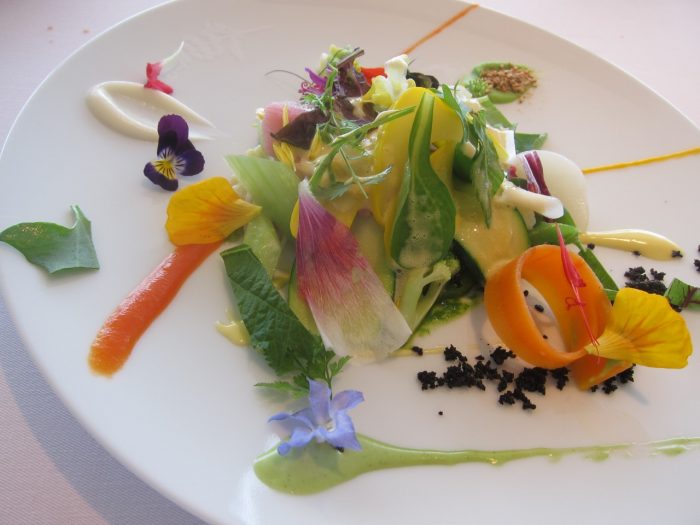
The famous gargouillou dish by Michel Bras / ©Andy Hayler
Michel Bras is an iconic French chef whose eponymous restaurant in the hills above the commune of Laguiole won three Michelin stars in 1999. Despite its remote location, it became perhaps the toughest reservation to get in France, famed for the deep connection to locally grown and foraged vegetables, herbs and wildflowers. His striking gargouillou dish features dozens of different plant elements prepared in different ways and is perhaps the most copied dish in all of fine dining. Bras also gained three Michelin stars for its sister restaurant near Toya in northern Japan, located in a solitary building that is literally on the edge of a volcanic crater and its lake. The gargouillou dish there features Japanese rather than French vegetables and herbs, but with the same deep connection to the local countryside. Even if you have never eaten this famous vegetable dish you will almost certainly have tried one of Bras’ other inventions, the chocolate fondant.
Stephen Harris
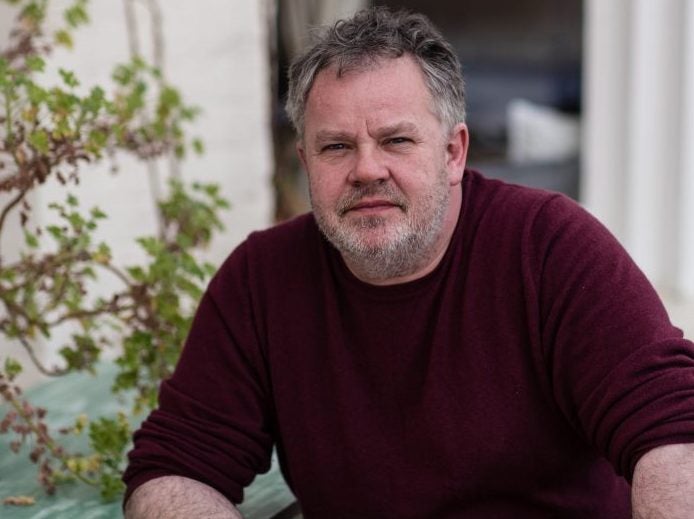
Stephen Harris ensures virtually every ingredient is sourced within walking distance of The Sportsman / ©Philip Harris
Stephen Harris is a self-taught chef who embodies the notion of hyper-local cuisine. In the unassuming premises of The Sportsman on the Kent coast in England’s southeast, Harris and his team produce meals where virtually every ingredient is sourced within walking distance of the restaurant. This is true of the pork from the next-door farm, the local oysters, the fish from the Thames estuary, through to the vegetables and herbs grown in the restaurant garden. Even the salt is made from boiled seawater collected from the windswept beach that is yards from the premises. Although his food is ultra-local, his influence is not, and chefs from around the world have eaten at The Sportsman and taken inspiration from its philosophy of ultra-local sourcing.
[Related: Five Best Restaurants in the World with Andy Hayler]
The New Wave
What of the future? Sustainable dining is on a roll, and so it is interesting to speculate on which other chefs will have a similar level of influence in the next decade.
Daniel Humm
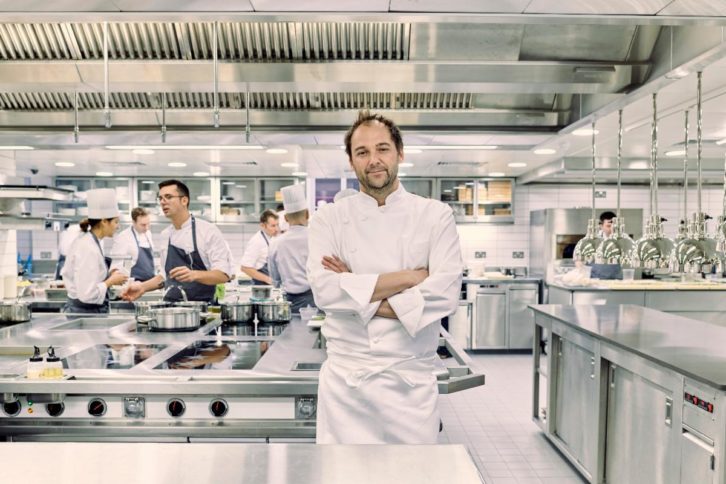
Daniel Humm of Eleven Madison Park / ©Sebastian Nevols
One candidate is Daniel Humm, who after having trained and worked in his native Switzerland, made his name in New York at his three- Michelin-star restaurant Eleven Madison Park. This innovative restaurant has garnered numerous culinary accolades, with Humm showing a consistent restless desire to reinvent his menus and dishes in creative ways over the years. He announced that from June 2021, the restaurant would serve only vegan food. This is a risky step for such a high-profile restaurant but is a sign of the chef’s deep commitment to sustainability, going even further than fellow US chef Dominique Crenn, who stopped serving meat at her three-Michelin-star San Francisco restaurant in 2019.
Ben Shewry
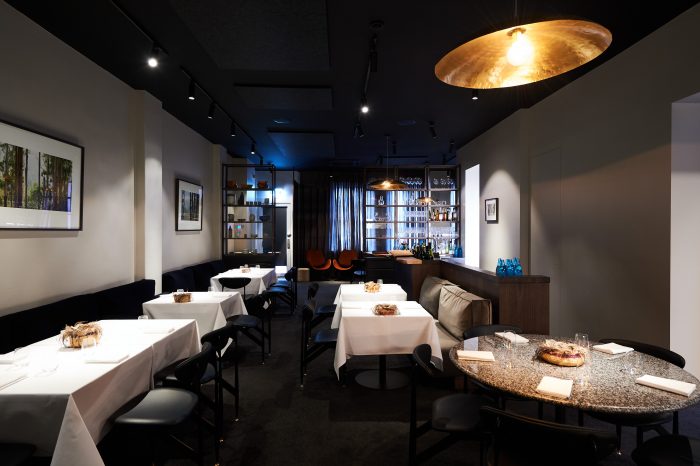
Ben Shewry’s Attica in Melbourne / ©Colin Page
Far away from cosmopolitan New York is another chef who has a long-term commitment to sustainability. Ben Shewry grew up on a farm in New Zealand but has built up his reputation at his Melbourne restaurant Attica. A Melbourne suburb is a long way from the culinary centers of Europe, Japan and the US and yet his restaurant has been ranked 20th in the World’s Best 50 Restaurants and 70th in the reader-voted Elite Traveler Top 100 Restaurants list. Shewry is particularly interested in the sustainability of fish and seafood, using only produce that is rated as the most sustainable “green” category by the “Good Fish” sustainable seafood guide. Since it opened in 2005, Attica has been known for using native herbs and leaves, such as the local saltbush and bunya pine nuts grown in the gardens of the neighboring Ripponlea Estate, in a pioneering approach to sustainable cooking in Australia.
Anne-Sophie Pic
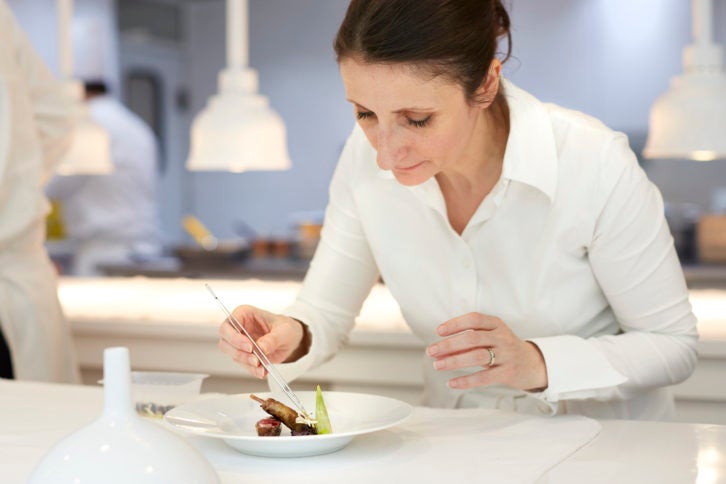
Anne Sophie Pic was the only female chef in the France guide to have three Michelin stars
France’s only female three-star Michelin chef, Anne-Sophie Pic, comes from a long line of cooks (her grandfather also held three Michelin stars). Restaurant Pic in Valence was awarded three Michelin stars in 1933, the very first year that Michelin introduced the multi-star system. Pic has long had a deep relationship to the locally grown and raised produce that it serves, from the superb pigeon of Drôme, the local white garlic, the olives of Nyons or the Pintade guinea fowl. Pic is on a mission to modernize some aspects of traditional French cuisine, producing a lighter version of the rich sauces that have long been at the heart of high-end French cooking. She puts an emphasis on vegetables in her cooking, with her favorite ingredient being beetroot. Pic now has a green Michelin sustainability star to add to its long-held three red stars.
Andreas Caminada
There are few more striking restaurant settings than the mountain perch of Schloss Schauenstein, which sits in the heart of the Swiss Alps. Andreas Caminada is committed to a sustainable approach to cooking, with the hotel restaurant using entirely renewable energy, and its vegetables grown to order by local organic farmers as well as in the gardens of the property. All meat served on the plate comes from local farmers, and even the fish served here, such as Arctic char and pike perch, is only sourced from the lakes and rivers of Switzerland. In 2019, the restaurant won the World’s 50 Sustainable Restaurant award with the highest score ever attained in the competition. There are no compromises on flavor here, and when I inquired about the origin of a particularly fine piece of pork that I had just eaten, the waiter pointed to the hillside opposite the dining room.
Angel Leon
Angel Leon runs the three-Michelin-star restaurant Aponiente in Cadiz and is a standard-bearer for sustainable seafood. Just a fifth of all fish that is eaten in the world is cultivated, and the list of overfished species is lengthy. Leon uses different seaweeds, edible plankton and marine sugars in place of the traditional luxury seafood offerings of fine dining restaurants. He even makes charcuterie from discarded fish. Snacks may include a sea urchin cookie or a biscuit made from prawn shell flour. The restaurant works with marine biologists and universities to explore ever more examples of underutilized food from the local waters. His ocean to plate approach hopes to turn the tide of opinion on how best to utilize the bounty of the sea in a way that will still be viable in generations to come.





